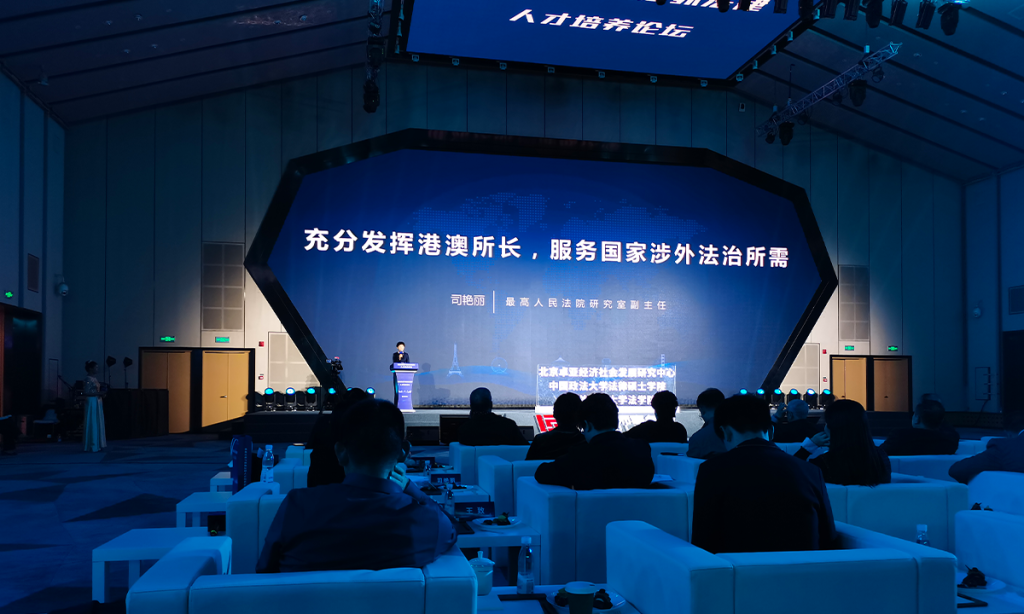Forum addressing 'foreign-related laws' held in Beijing to enhance China's global legal discourse power

A forum focusing on enhancing China's foreign-related legal system and the cultivation of talents in the niche legal field was launched on Sunday in Beijing.
The event was attended by several Chinese experts in the legal field. Some of them were veterans of the "court" organ while others were scholars of law departments at China's higher-education schools such as Beijing Foreign Studies University.
The forum represents China's all-round efforts to strengthen its foreign-related legal system, which Chinese President Xi Jinping emphasized at the 10th collective study session held by the Political Bureau of Communist Party of China CPC Central Committee on November 27.
Qiao Xiaoyang, the former chairman of the National People's Congress Law Committee, gave an opening speech to indicate the urgency of boosting the foreign-related legal system as in the international legal community China has gone from being a "calm rational observer" to a "participant in making regulations with the integrity of justice and equality."
"By enhancing our 'legal confidence,' we can amplify the country's discourse power in the international legal community while allowing us to become better connected to the world," Qiao remarked.
Tribunal experts such as Gao Xiaoli and Si Yanli shared their insights on detailed legal aspects such as establishing mechanisms for international commercial dispute settlements as well as how to boost China's foreign law relations with the world by borrowing the developing strengths of the Guangdong-Hong Kong-Macao Greater Bay Area (GBA).
Gao, a judge with the China International Commercial Court (CICC), said that thanks to China's prosperous and growing Belt and Road Initiative (BRI), the country's business exchanges with the world are surging and fruitful but it is also unavoidable that business conflicts will emerge.
She then proposed to establish a "comprehensive legal platform" that can provide a "one-stop service" to deal with international business disputes. The platform includes not only tribunal and council facilities, but should have a combined mechanism of "arbitrament" and "legal mediation" for disputes to be settled in the most "low cost and efficient" way.
In September, the fourth batch of typical international business dispute cases were revealed by the Supreme People's Court of China. By collaborating with 10 international commercial arbitration institutions, more than 7,891 cases have been settled in the past five years, including international cases involving countries such as Thailand, Italy and the US.
As the heart of China's international trading, the GBA exhibits China's legal confidence by embracing diverse legal systems. Si, the deputy director of the research department of the Supreme People's Court of China, has encouraged more "frequent exchanges" between legal institutions in the Chinese mainland and the Hong Kong and Macao Special Administrative Regions.
Wang Junhui, an international legal expert, told the Global Times that more exchanges can help Chinese mainland enterprises "go global."
"The emergence of such new strategies in the legal field also reflect China's growing social modernization. Laws should keep up with the times too," Wang told the Global Times.
To support such social-legal strategies, nation-wide legal education should keep up to provide the country with more talents and think tanks.
At the event, experts such as Wang Haiyan, the head of the Academic Office of China University of Political Science and Law, shared a unique educational strategy to cultivate "interdisciplinary talents."
A legal student should be trained with knowledge in foreign languages, economy and finance as well as cultural studies.
"We are seeking to train young Chinese legal workers who know how to deliver legal points in context with their own narrative systems and ideologies," the expert noted.
The event was held at the CP Center an co-organized by the Law School of Beijing Foreign Studies University, School of Juris Master in China University of Political Science and Law and the Beijing Zhuoya Research Center for Economic and Social Development.